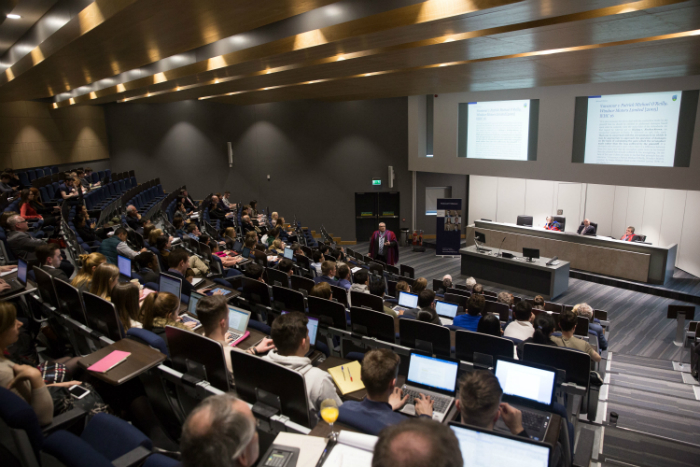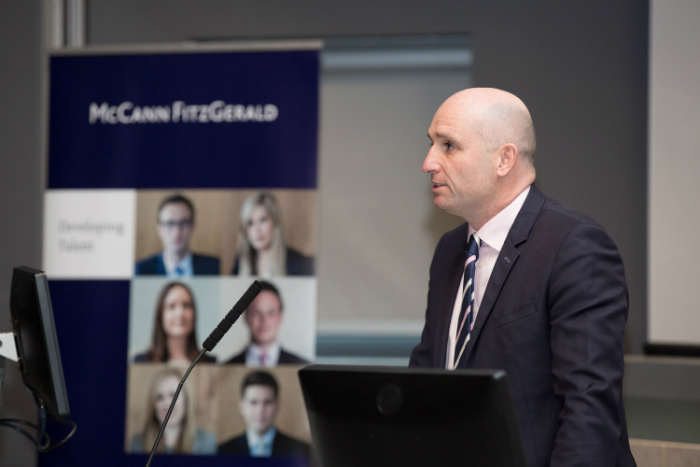Devenney Inaugural Lecture
News
- The James C Brady Prize Award winning students for 2022/2023
- Matheson Diversity in Law Newman Fellow appointed at UCD Sutherland School of Law
- Guide for 2024 Referendums on Family and Care
- Professor Aisling Swaine joins UCD Sutherland School of Law from UCD School of Social Policy, Social Work and Social Justice
- Aedamar Comiskey is honoured as Law Alumni Award Winner 2023
- The Bank of Ireland Finance Student Awards November 2023
- Milestone Reunion of the Classes of 1983, 1993, 2003 and 2013
- The new Individual Accountability Framework in Financial Services Ireland
- Leading scholar of EU Law and Labour Law appointed Full Professor at UCD Sutherland School of Law
- Court of Appeal Workshop
- Four Adjunct Professors Appointed to UCD Sutherland School of Law
- Launch of Barristers in Ireland: An Evolving Profession Since 1921 by Dr Niamh Howlin
- UCD SUTHERLAND OPPORTUNITY supported by MASON HAYES & CURRAN LLP BURSARIES
- Professor Ian O'Donnell wins US Criminology Book Award
- Four UCD Law students take part in Our Rule of Law Academy in Brussels
- International Conference on Education and Democratic Citizenship (ICEDC) hosted in Sutherland School of Law
- International Symposium “Entrenching a Global Health Emergency Mode: Implications for Health and Human Rights Law”
- John M. Kelly lecture 2023 delivered by Baroness Onora O’Neill
- The 1981 BCL Class celebrate forty years since graduation
- Minister Roderic O’Connor chairs panel at seminar hosted by UCD Centre for Constitutional Studies
- Leading scholar of international refugee and migration law appointed Full Professor at UCD Sutherland School of Law
- Caoilfhionn Gallagher KC appointed Adjunct Full Professor at UCD Sutherland School of Law
- Copy of Donnybrook Magdalene Laundry Book Presented to the President of Ireland
- UCD team wins the 2023 Corn Adomnáin – International Humanitarian Law Competition
- UCD Sutherland Opportunity supported by Mason Hayes & Curran BURSARIES
- HRER/ UCD Conference 12 June 2023: preliminary announcement and Call for Papers (deadline 13.03.23)
- Professor Gráinne de Búrca awarded UCD Honorary Degree of Doctor of Laws
- Further Learning in Employment Law
- UCD Law Team wins the National Moot Court Competition 2022
- Dr Michael F Farrell, human rights activist awarded Honorary Degree of Doctor of Laws
- UCD Law alumna, Judge Síofra O’Leary, appointed president of European Court of Human Rights
- Large numbers of Alumni attend the 2022 Milestone Reunion
- Portrait of Mrs Justice Catherine McGuinness
- Dr Lukasz Grzejdziak appointed to EU Project for sustainable reforms in Ukraine's justice sector
- Mr Justice Gerard Hogan launches ‘Palles: The Legal Legacy of the Last Lord Chief Baron
- Conferring of UCD Matheson PhD Scholar in Commercial Law
- UCD PhD Student Awarded Irish Research Council Funding
- Professor Laurent Pech appointed Dean at UCD Sutherland School of Law
- Magdalene Laundries: Told, Acknowledged and Not Forgotten
- Professor John D Feerick conferred with honorary Degree of Doctor of Law
- 2022 Matheson | UCD Leadership Series Crypto and the Digital Assets Revolution: What’s Next?
- Histories of Probation in Ireland: A Theoretical Analysis
- Three Upcoming Constitutional Law Conferences in UCD Sutherland School of Law
- Lord Hendy focuses on P&O Ferries for the 2022 Guest Lecture in Employment Law
- Lord Sumption delivers the 2022 John M. Kelly lecture to a large audience in UCD Sutherland School of Law
- Chief Justice Launches UCD Student Legal Services Journal 2022
- The Rt. Hon the Lord Mayor of the City of London, Alderman Vincent Keaveny visits UCD Sutherland School of Law
- UCD Law hosts Student Event on The European Strategic Autonomy with Admiral Mellett (ret.) and Colonel Dirou
- UCD Law Students Refugee Law Mooting Success
- Major Conference on Philanthropy hosted by UCD Sutherland School of Law
- Fourteen Law Students Awarded Medals at Bank of Ireland Prize Giving
- Professor Imelda Maher appointed Fellow at New York University
- 2022 Helga Pedersen Moot Court Competition
- Ad Astra Fellows, UCD Sutherland School of Law
- Sutherland Fellow in French Law 2021/22
- Legal History Research Group publishes new book
- Mentors Sought for UCD Law Students
- Alumnus Vincent Keaveny appointed Lord Mayor of the City of London
- Three Doctoral candidates awarded Irish Research Council Scholarships
- European Traineeship in Intellectual Property
- THE Rankings position UCD Sutherland School of Law as Ireland’s leading University Law School
- The Class of 2022
- News 2021
- News 2020
- News 2019
- News 2018
- News 2017
- Walsh Lecture 2017
- PhD Graduations 2017
- Award of Honorary Doctorate
- Roman Tomasic Lecture
- Guest Lecture Employment Law 2017
- 2017 Reunion
- Restorative Justice Book Launch
- EU Field Trip 2018
- Law Review 2017
- ENVREG Climate Litigation Seminar
- Competition Law in Hong Kong & Ireland
- RIA PhD Seminar
- 41st Bank of Ireland Student Awards
- Insights into Non Law Careers for Law Graduates
- Caoilfhionn Gallagher QC honoured with Law Alumni Award 2017
- Dr Lynsey Black presents at ‘Human Rights in Focus’
- College Teaching Awards
- FET Entry Route
- Legal Scholars Conference
- University Teaching Awards
- 2017 Graduation
- Doctorate Graduations
- Ad Astra Athletes
- Arthur Cox Student Awards 2017
- Class of 2017
- Joint UCD-Queens PhD Workshop
- BLREG Seminar
- Summer Internships
- Profession Diploma Employment Law Graduation
- EU Judges Training
- Law and the Family
- 19th Annual Irish European Law Forum
- Criminology Lecture June
- Fulbright Award
- Rest Here Installation
- Mason Hayes Curran Prize
- Professional Regulation Seminar
- McCann FitzGerald sponsors students for Olso Competition
- Human Rights Teacher Training
- Students Human Rights Programme
- Brexit and Human Rights
- Matheson Sponsored PhD
- Mooting and Debating
- Study Visit to London
- Devenney Inaugural Lecture
- Alumni Reception in Brussels
- Bar Council of India
- Gradireland National Student Challenge
- Post Brexit Legal Landscape
- Conor White, Law with Economics, receives UCD Astra award
- The John M Kelly Memorial Lecture 2017
- SLS Reception at Irish Embassy
- UCD Sutherland School of Law Number 1 in Ireland in QS Rankings
- UCD - Riga Colloqium
- Human Rights Clinic - Conversation with Magdalene Survivors
- President Deeks Presents Student Awards
- A Celebration of UCD Sutherland School of Law
- Modern International Law
- UCD Law Students win Irish Times Debate 2017
- Keane on Company Law
- Workshop on Bitcoin and Blockchain
- Fundamentals of the Irish Legal System
- News 2016
Professor Devenney Delivers Inaugural Lecture

Professor James Devenney, the new McCann FitzGerald Chair of International Law and Business at University College Dublin’s Sutherland School of Law, yesterday delivered his inaugural lecture entitled "Spies, Parking Tickets, Illegal Transactions and Insider Dealing”. Professor Devenney reflected on four recent cases which fundamentally alter our understanding of Contract Law and have wide-reaching implications for lawyers and businesspeople alike.
Professor Devenney is currently overseeing the prestigious Master’s Degree in International Law and Business offered jointly by the UCD Sutherland School of Law and the UCD Smurfit Graduate School of Business. This programme, established in 2014, offers an innovative degree for students who have successfully completed an undergraduate degree in law, business or related disciplines.


Commenting on Professor Devenney’s lecture, Barry Devereux, Managing Partner of McCann FitzGerald said, “James is widely recognised as a world-leading expert on Transactional Commercial Law and his inaugural lecture showed why his insight is so valuable to international business and law, and particularly important in uncertain times for trade globally. At McCann FitzGerald we are very proud to have him represent our firm in the legal educational world and we look forward to building on our ongoing support of the Chair.”
Professor Imelda Maher, Deputy Dean of UCD Sutherland School of Law said, “We were delighted that Professor James Devenney took up the role as McCann FitzGerald Chair in International Law and Business. His insightful and thought-provoking inaugural lecture is a real demonstration of the expertise he has already brought to the position and we look forward to him continuing to build on this work.”
Professor Devenney chose four cases to represent some important recent and ongoing developments in the law of contract in the UK and Ireland. The first was Attorney General v Blake [2001] 1 AC 268 concerning the proper method of assessing damages for breach of contract if the breach has generated a profit for the defendant without a corresponding loss for the plaintiff. The House of Lords held that, in exceptional cases, it may be just and equitable to order the defendant to pay damages corresponding to some or all of the profit made, where the plaintiff's interest in performance of the contractual obligation warrants this. It remains unclear how exceptional this should be, where the notion of an "efficient breach" (ie that society benefits by allowing a defendant to retain whatever profit from the breach that exceeds the plaintiff's loss) now stands and how Blake relates to cases on damages for a lost opportunity to bargain for the defendant's release from the contract.
The second case that Professor Devenney examined was ParkingEye Limited v Beavis [2016] AC 1172. The UK Supreme Court here rejected the sharp distinction between a penalty clause (unenforceable) and a genuine pre-estimate of the damage caused by a breach of contract (enforceable). Instead, the court should examine a provision by asking whether the "the impugned provision is a secondary obligation which imposes a detriment on the contract-breaker out of all proportion to any legitimate interest of the innocent party in the enforcement of the primary obligation." (Lord Neuberger and Lord Sumption). As with Blake this emphasizes the injured party's interest in performance and requires a more sophisticated analysis of this than the nineteenth centuries cases employed. It is not fully clear how this new approach will be applied and how it relates to the law on relief against forfeiture.
(opens in a new window)James Devenney Lecture from (opens in a new window)UCD Sutherland Law on (opens in a new window)Vimeo.
Professor Devenney finished by looking at two cases - Patel v Mirza [2016] UKSC 42 and Quinn v Irish Bank Resolution Corporation Ltd (In Special Liquidation) [2015] IESC 29. The highest courts in England and Wales and in Ireland agree that the law in relation to the enforceability of illegal contracts (and restitution of money paid or property transferred under them) needs to be more flexible. However, if the prevailing view in England and Wales is that the circumstances of each case need to be assessed (such as the seriousness of the breach or the degree of culpability of each party), the Irish position is that each statutory scheme should be analysed to decide what the consequences of illegality should be, but that all cases falling within each statute should be treated alike.